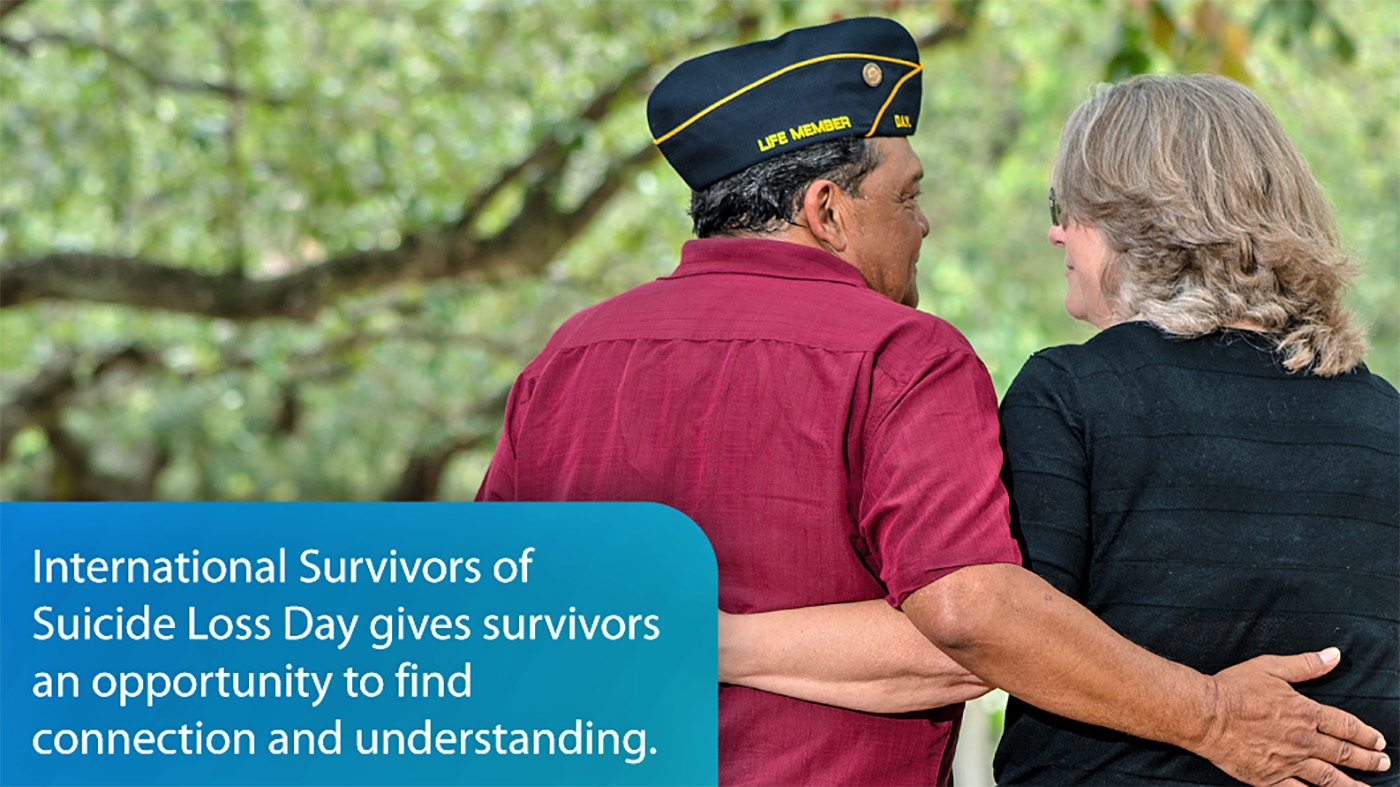Unfortunately, many of us know someone who died by suicide. Suicide knows no bounds. It affects people from all races, ethnicities and backgrounds.
Veterans and non-Veterans alike are affected by suicide. Every loss hurts, and it can leave family, friends and Battle Buddies struggling to find ways to cope.
Each year, International Survivors of Suicide Loss Day gives survivors a day to find connection, understanding and hope through their shared experience. Events will take place in communities across the country on Nov. 23.
The American Foundation for Suicide Prevention International Survivors of Suicide Loss Day offers resources for survivors, shares loss survivor stories and provides details on International Survivors of Suicide Loss Day events. If you need support, I encourage you to visit this site.
I also want to share some information that may be helpful if you’ve lost someone to suicide and are on the path to healing.
No one is to blame for suicide
Often, after a suicide, survivors are left with questions like: Why did my loved one take their own life? Did I miss warning signs? Could I have prevented the suicide?
Suicide is complex, but there are three things we know:
- Suicide isn’t caused by a single or specific event.
- Suicide isn’t random.
- There’s no single solution to suicide.
Suicide is the result of a complex interaction of risk and protective factors at the individual, community and societal levels. Risk factors are associated with an increased likelihood of suicide behaviors and can include a history of prior suicide attempts, certain mental health conditions, access to lethal means—like firearms or certain medications—and stressful life events, such as divorce, job loss or the death of a loved one.
Protective factors can help offset those risk factors and are characteristics associated with a decreased likelihood of suicide behaviors. They include access to mental health care, feeling connected to other people and positive coping skills.
Coping with a suicide loss
While grieving, it’s normal to experience intense and distressing thoughts and emotions, such as denial, anger, sadness and loneliness. These thoughts and feelings may be hard to talk about and may last a long time, change over time, and resurface on holidays, anniversaries and birthdays.
It’s not uncommon to develop certain mental health conditions, such as depression and anxiety, which make it even harder to cope.
Remember: People who lose someone to suicide can develop posttraumatic stress disorder. Symptoms include feeling stressed or frightened long after you’ve experienced a traumatic event. You may also have thoughts of suicide yourself, especially if you feel lonely.
Resources for coping with loss
Here are a few resources that may help during this difficult time:
- The Veterans Crisis Line provides immediate confidential crisis support. You don’t have to be enrolled in VA health care or benefits to use the Veterans Crisis Line. To reach responders 24/7, Dial 988 then Press 1, chat online at VeteransCrisisLine.net/Chat, or text 838255. Get more information about the Veterans Crisis Line.
- VA offers resources for survivors of suicide loss. We offer you this guide, created in collaboration with the Veterans Health Administration, Veterans Benefits Administration and the National Cemetery Administration, to help you during this difficult time. In the aftermath of losing someone to suicide, you may be deeply distressed and unsure of what to do next. While your grief experience is unique, please know that you are not alone.
- VA suicide prevention coordinators (SPCs) are available to connect you with others who can help in your healing process after a suicide. Find SPCs at VA medical centers across the country through the Veterans Crisis Line Resource Locator.
- The Tragedy Assistance Program for Survivors (TAPS) offers compassionate care to all those grieving the loss of a military loved one, including those who lost someone to suicide. You can call TAPS 24/7 at 1-800-959-TAPS (8277) or visit TAPS online.
- The Suicide Prevention Resource Center provides a list of additional recommended resources for individuals and communities after a suicide loss.
- You can also search for local support groups through the SAVE and the American Foundation for Suicide Prevention websites.
The grieving and healing journey
Sadly, many people know someone who died by suicide. As a Veteran who has spent my career working with Veterans and as someone who has experienced suicide loss, I understand how hard it is to find a way to cope and move forward. I hope this article has given you some tools to help in your grieving and healing process.
Topics in this story
Link Disclaimer
This page includes links to other websites outside our control and jurisdiction. VA is not responsible for the privacy practices or the content of non-VA Web sites. We encourage you to review the privacy policy or terms and conditions of those sites to fully understand what information is collected and how it is used.
More Stories
As severe weather threatened Mississippi, local news warned of a dangerous outbreak of tornadoes. A VA nurse stepped up.
Dorothy “Pat” Rudd, 103, World War II Navy Veteran, has lived a life of service, pioneering the way for women in the military.
VA employees help return WWII items to two brothers’ families. Both brothers were WWII Veterans.





